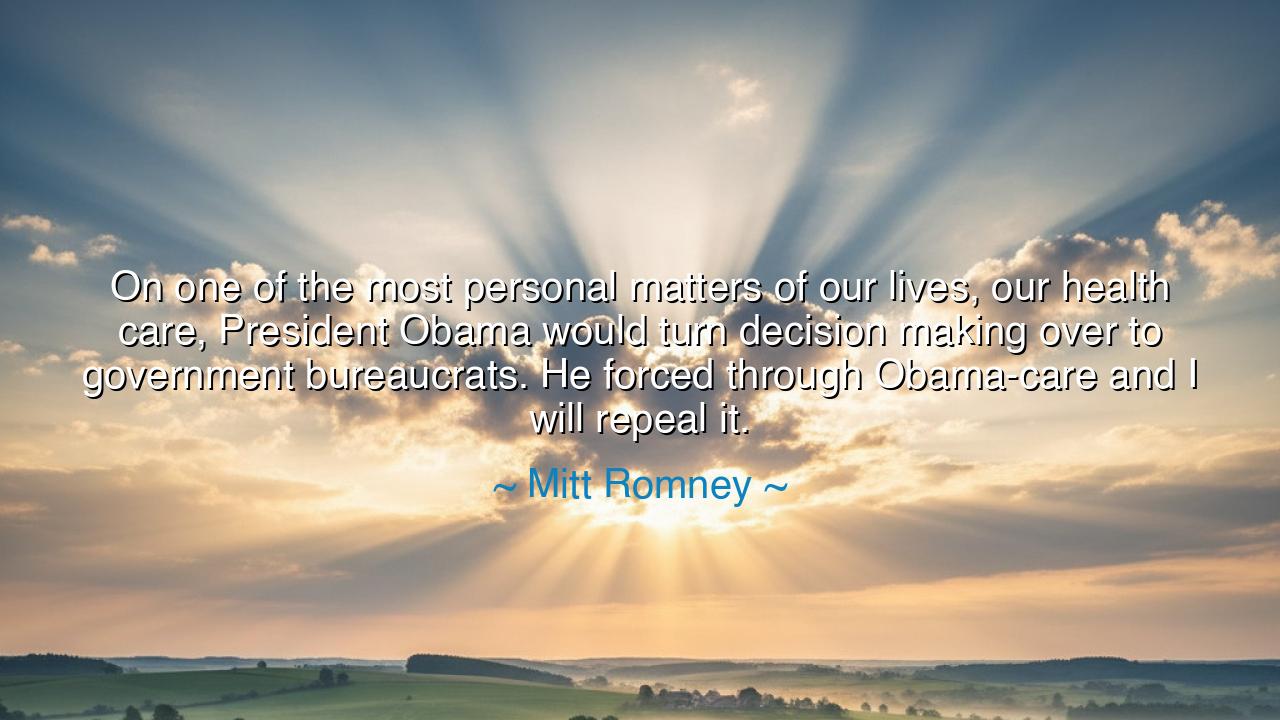
On one of the most personal matters of our lives, our health
On one of the most personal matters of our lives, our health care, President Obama would turn decision making over to government bureaucrats. He forced through Obama-care and I will repeal it.






The Cry for Freedom in Governance
Hear now the words of Mitt Romney, spoken amid the great debates of the modern republic: “On one of the most personal matters of our lives, our health care, President Obama would turn decision making over to government bureaucrats. He forced through Obama-care and I will repeal it.” These words, though born in a moment of political conflict, carry an ancient echo—the timeless struggle between the freedom of the individual and the reach of the state. Romney’s declaration is not merely about policy; it is about agency, the sacred right of each soul to make choices for its own body, its own family, and its own destiny.
The Meaning of the Teaching
In this quote lies the enduring question: who should hold power over the life of the individual—the people themselves or the machinery of the state? Romney speaks from a belief as old as the republic itself—that liberty must be guarded even in compassion, that when government overreaches, even in the name of care, it risks becoming a master rather than a servant. To him, the realm of health is not just political—it is personal, bound to the dignity and autonomy of each person. Thus, his warning is both practical and moral: that in the desire to heal all, one must not bind all under the same hand.
The Origin of the Words
These words were spoken during the fierce contests of the early 2010s, when the United States stood divided over the Affordable Care Act, or Obama-care, the signature reform of President Barack Obama. The law sought to expand health insurance and bring the power of regulation into a system long dominated by private markets. To its supporters, it was an act of compassion and progress; to its critics, it was the rise of bureaucracy into the most intimate sphere of human life. Romney, then a candidate for the presidency, spoke not only against the law itself, but for a vision of governance rooted in individual responsibility, choice, and freedom—principles that he believed must remain untouched by the heavy hand of centralized power.
The Parable of the Doctor and the King
Long ago, in a kingdom of the East, there lived a wise physician whose healing hands were renowned throughout the land. The king, fearing that some might receive more care than others, decreed that all healers must follow his council’s commands. The physician obeyed, but as the years passed, the people grew weary—patients were treated not according to their needs, but by decree. The healer’s art became tangled in paperwork and permission, and compassion was replaced by compliance. In time, the people no longer trusted the healers nor the king. And the wise physician, weeping, said, “Healing cannot be ruled—it must be chosen.”
So too does Romney’s cry reflect this ancient lesson: that when care becomes law without freedom, its spirit withers, even if its intentions were noble.
The Struggle Between Heart and System
Every age faces this struggle. The heart longs for universal care, but the mind warns of universal control. A system built to protect can also suffocate; a program designed to help can grow beyond its purpose. Romney’s words are not those of cold denial, but of caution. He does not scorn the healer’s heart, but warns against the rule of the unfeeling bureaucrat—the one who sees not the person, but the form; not the illness, but the number. He reminds us that compassion without liberty can become tyranny disguised as kindness. The ancients knew this truth well: that even the healer must not forget that every soul carries its own will, and that freedom is itself a medicine.
The Flame of Autonomy
Health, in Romney’s view, is among the most personal matters of life—woven into the essence of survival and identity. To surrender its management entirely to a distant authority is to relinquish one’s sovereignty over the very breath that sustains existence. His vow to repeal Obama-care was therefore more than political—it was a symbolic act of resistance, a pledge to defend the principle that choice is the heart of freedom. For if the state commands the care of your body, how far is it from commanding the choices of your soul? The health of a nation depends not merely on its hospitals, but on its respect for the liberty of its people.
The Lesson for the Generations
Therefore, O listener, let this truth settle in your heart: freedom and compassion must walk hand in hand. Too much freedom without care breeds cruelty; too much care without freedom breeds control. The wise society must find balance, ensuring health for all without extinguishing the flame of individuality. Let every citizen remain vigilant that laws made in mercy do not become chains in disguise. The state may guide, but it must never command the conscience of the people.
The Eternal Counsel
So remember the words of Mitt Romney—not as a call to division, but as a reminder of the delicate balance that sustains civilization. “On one of the most personal matters of our lives, our health care…” he began, for he knew that the body is the first kingdom of every person. Guard that kingdom well. Seek both justice and liberty, both compassion and choice. For the health of the body is sacred—but so too is the freedom of the soul. And only in the harmony of both shall a people remain strong, prosperous, and truly whole.






AAdministratorAdministrator
Welcome, honored guests. Please leave a comment, we will respond soon